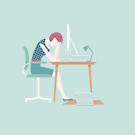New norm stress relief
“Minimise prolonged sitting” was what the government advised way back in March when the realisation that lockdown was imminent first hit the UK.
Then when some warmer weather arrived the vast majority of the population basked in the sun, getting to grips with gardens while working and babysitting all at the same time.
So we’re a talented bunch, but that doesn’t make our bodies capable of extraordinary things, and when you consider the NHS spends more than £1billion a year treating back pain – not to mention the fact any employees struggling with their back sometimes require up to 17 days off work to recover – our bodies really are precious and important.
And it’s often simple things like work setup, spending longer hours sitting down watching TV and bad posture that cause most of us issues. Around 80% of adults experience lower back problems at some point in their life and it’s the second most common cause of work absence.
But don’t let all this stress you out – indeed, stress is another hurdle to overcome but we’ve ways to help you there too.
So, with work from home here to stay – certain employees have already been told not to expect working in their office until at least 2021 – it’s time, while we have the time at least, to make it work for you.
“I think a lot of us are going to be working from home at least part of the time a lot more in the future! As always, the thing we see most commonly is stiffness and pain in the neck, upper back, lower back and shoulders,” says Six Physio’s Georgie Adams.
“As a general rule, the absolute best thing you can do is just keep moving. Try and set a timer on your computer or phone for every 30 minutes. Research shows that if we can do a few quick stretches every half hour, that can go a long way towards preventing pain.”
Georgie has some great tips and stretches to help you to continue working, cooking, exercising in your home and looking after the kids seemingly all at once.
But interestingly she says perhaps the simplest way to instantly release stress – which all of us will have felt at some point this year and which can cloud your mind and see productivity drop off the scale – is by breathing.
“Sounds simple, but it's something that many of us are not doing optimally – especially when we are feeling anxious.
“When we are stressed, we tend to breathe much more in the upper chest, and do not allow much movement in our bellies. This in turn can cause tension in the back, core and pelvic floor.
“If you are feeling stressed, try to sit comfortably and place one hand on your upper chest and one hand on your tummy. Try to inhale for the count 4 seconds deep down into your belly. You should feel the lower hand move as your belly expands. Keep your muscles relaxed and repeat for 10 breaths.”
Even at your workstation you can easily try out Georgie’s simple tip – remember deep breathing and get your stomach involved!
You could also invest in a workstation where you can stand and type – or perhaps even a treadmill so you can walk in your own home while on work calls.
But really the best advice seems to be to not stay put for too long, making quick and efficient stretches a great way to stop body lockdown.
When it comes to working out, fighting your feeling of exasperation or frustration can be a powerful catalyst but Georgie has some sage advice.
“The thing I see done most incorrectly is high intensity interval training (HIIT). There is nothing wrong with it as an exercise, but it's important to make sure you have control and are activating the right muscles or you can be at risk of injury. Just start slow and if you're feeling pain – check your form!”
Last but not least, don’t ignore your poor bottom. You could try kneeling as you type, just be wary of when you stand up as your legs will feel numb. And realistically, you won’t be able to maintain that position for long.
So our bottoms will feel numb too from hours of sitting – and Georgie says in her experience people most often ignore the glutes.
“Glutes are important for hip and knee control during exercises like squats, lunges and running. They are also an important stabiliser of the spine. Make sure you're activating these muscles and try to work them in single leg exercises too,” she says.
Good luck, stay supple and consign lockdown niggles to the bin with Georgie’s expert advice.
Georgie Adams is a women’s and men’s health physio as well as rehab specialist with Six Physio in London, having worked as a musculoskeletal physiotherapist in Australia before moving to the UK.




